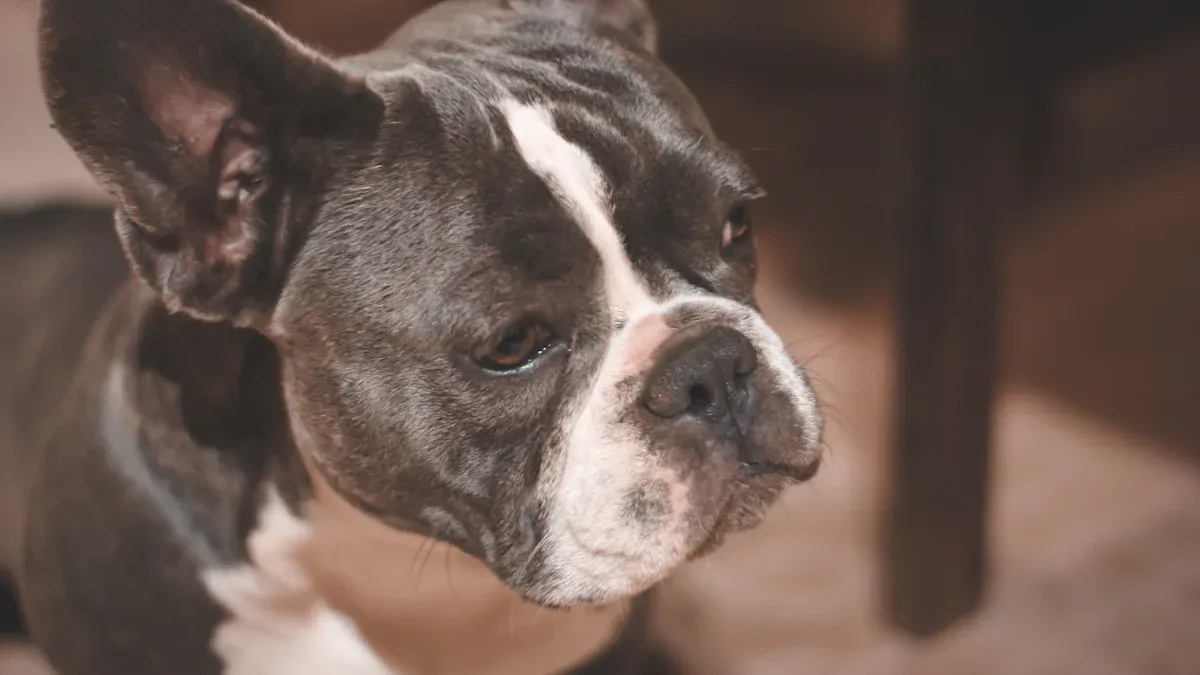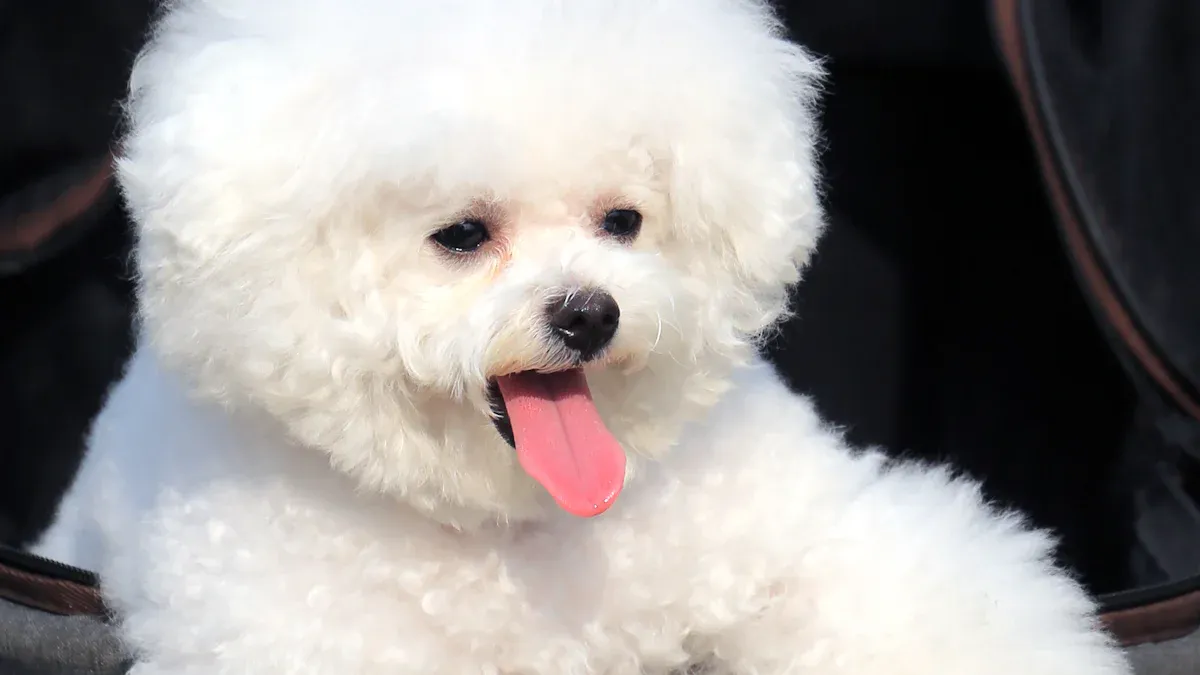French Bulldogs are not hypoallergenic. If you have dog allergies, you may think short hair is better. That is not always right. Hypoallergenic means a dog is less likely to cause allergies. But no dog breed is totally safe. You can still react to dander, saliva, or fur. You can try things like dog pajamas or a Dog Shedding Bodysuit. These can help lower allergens in your home.
Hypoallergenic dogs usually lose less dander and fur. This makes them easier for people with allergies.
Key Takeaways
- French Bulldogs are not hypoallergenic. They can still cause allergies due to dander, saliva, and fur.
- No dog breed is completely safe for allergy sufferers. Always spend time with a dog before bringing it home.
- Regular grooming helps reduce allergens. Brush your dog often and bathe them weekly to control shedding.
- Keep your home clean to lower allergens. Vacuum frequently and wash your dog's bedding and toys.
- Consider hypoallergenic breeds if you have allergies. Breeds like Poodles and Bichon Frises shed less and may be better for you.
What Does Hypoallergenic Mean?
Definition
You might hear the word "hypoallergenic" when you look for a dog that fits your family. This term comes from "hypo," which means less, and "allergenic," which means something that causes allergies. So, a hypoallergenic dog is less likely to make you sneeze or itch. Some people think these dogs are totally safe for allergy sufferers. That’s not true. Scientists say no breed is completely hypoallergenic. You can still react to proteins found in dog dander, saliva, or even urine. These tiny particles can float in the air and cause your body to fight back. You might notice symptoms like itchy eyes, sneezing, or trouble breathing. Even a french bulldog can trigger these reactions, even though it has short hair.
Tip: If you have allergies, spend time with a dog before you bring one home. Your reaction can be different from someone else’s.
Common Myths
French Bulldogs are not hypoallergenic - but you don’t have to give up your dream of owning one if you take the right steps.
Many people believe things about hypoallergenic dogs that just aren’t true. Let’s clear up some of the biggest myths:
-
Myth #1: Hypoallergenic dogs never cause allergies.
Truth: No dog is 100% safe. Some just cause fewer problems.
-
Myth #2: You’re allergic to dog hair.
Truth: Allergies come from proteins in dander, saliva, and urine, not the hair itself.
-
Myth #3: Hypoallergenic dogs don’t shed.
Truth: All dogs shed. Some shed less, so you get less dander.
-
Myth #4: All Poodle mixes are hypoallergenic.
Truth: Mixing breeds doesn’t always make puppies hypoallergenic.
-
Myth #5: Short-haired dogs like the french bulldog are hypoallergenic.
Truth: Coat length doesn’t matter. Shedding and dander do.
You can see that choosing a dog is not just about hair or breed. It’s about how your body reacts to the dog’s proteins. Always check how you feel around a dog before you decide.
French Bulldog Allergies

Image Source: pexels
Shedding and Dander
Some people think short-haired dogs cause fewer allergies. This is not always true. French bulldogs shed a medium amount all year. They shed even more in summer and winter.
| Shedding Frequency | Season |
|---|---|
| Twice a year | Summer |
| Winter |
When they shed, dander gets into your house. Dander is tiny skin flakes. These flakes float in the air and stick to things. Even with short fur, french bulldogs make enough dander to bother people with allergies. You might sneeze or itch after touching your dog or cleaning up fur.
Tip: Brush your dog often. This helps control shedding and lowers dander in your home.
- French Bulldogs are not hypoallergenic.
- They make enough dander to cause allergies.
- They shed a medium amount, but shed more two times a year.
Saliva Allergens
Dog saliva can also cause allergies. Proteins in saliva stick to fur and skin. When your french bulldog licks itself, these proteins spread everywhere. Some breeds have more of these proteins. French bulldogs have a serum IgE level of 0.88. This is higher than pugs but lower than boxers.
| Breed | Proportion of Elevated Serum IgE Levels |
|---|---|
| French Bulldog | 0.88 |
| Boxer | 0.98 |
| Pug | 0.53 |
If you have allergies, you might react when your dog licks you. You can also react if you touch things your dog touched. Wash your hands after playing with your dog.
Note: Saliva allergens can stay on toys, bowls, and bedding. Clean these things often to help lower your risk.
Allergy Symptoms
You may want to know what allergy symptoms look like. People who are sensitive to french bulldogs often have these problems:
- Skin allergies: You might itch, see red spots, or get hot spots, mostly on your face, hands, or arms.
- Eye allergies: Your eyes may water, turn red, or feel sore.
- Digestive issues: Some people get sick to their stomach, have diarrhea, or gas after being near allergens.
If you notice these symptoms, try to see when they happen. Sometimes, symptoms get worse when your dog sheds more or after close contact.
Callout: If your symptoms are bad, talk to your doctor or an allergy expert. They can help you find ways to handle your allergies and keep your pet.
Managing Allergies
Grooming Tips
You can make a big difference in your allergy symptoms by grooming your dog the right way. Try these tips to keep dander and fur under control:
- Brush your dog every day to remove loose fur and keep the coat smooth.
- Bathe your dog once a week with a gentle, hypoallergenic or oatmeal-based shampoo. This helps wash away pollen, dust, and dander.
- Always rinse your dog well to get rid of all soap.
- Use a moisturizing conditioner to keep your dog’s skin healthy.
- Clean your dog’s facial wrinkles with special wipes or paste. These areas can trap dirt and moisture.
Tip: Regular grooming not only helps with allergies but also keeps your dog looking and feeling great!
Cleaning Your Home
Keeping your home clean is just as important as grooming your dog. Allergens can hide in many places. Here are some ways to lower them:
- Vacuum floors, carpets, and furniture often. Use a vacuum with a HEPA filter if you can.
- Wash your dog’s bedding, toys, and bowls every week.
- Wipe down surfaces where your dog spends time.
- Use air filters and humidifiers to help trap and remove allergens from the air.
Callout: A clean home means fewer allergens and a happier, healthier family.
Air Quality
You can improve the air in your home with the right tools. HEPA air purifiers work well for pet owners. They capture pet dander and other allergens floating in the air. This can help you breathe easier and reduce allergy symptoms. Place air purifiers in rooms where your dog spends the most time for the best results.
Medical Options
Sometimes, even with the best cleaning and grooming, you may still have allergy symptoms. You have several medical options to help you feel better:
| Treatment Type | Examples |
|---|---|
| Antihistamines | Cetirizine (Zyrtec), Loratadine (Claritin) |
| Nasal Sprays | Fluticasone (Flonase), Budesonide (Rhinocort) |
| Immunotherapy | Gradual introduction of allergens to build tolerance |
Allergy shots, also called immunotherapy, can help many people. These shots have a high success rate - about 85-90% for pet allergies. Talk to your doctor to see which treatment works best for you.
Note: You do not have to give up your french bulldog if you have allergies. With the right steps, you can enjoy life with your furry friend.
French Bulldog vs Hypoallergenic Breeds

Image Source: pexels
Alternative Breeds
If you have allergies, you can still get a dog. Some breeds are better for people with allergies. These dogs shed less fur and make fewer allergens. You might find one that fits your life and allergy needs.
Here are some popular hypoallergenic dog breeds:
- Poodle (all sizes)
- Yorkshire Terrier
- Shih Tzu
- Afghan Hound
- American Hairless Terrier
- Bedlington Terrier
- Bichon Frise
- Chinese Crested
- Coton de Tulear
- Schnauzers (giant, standard, and miniature)
- Irish Water Spaniel
- Kerry Blue Terrier
- Lagotto Romagnolo
- Maltese
- Peruvian Inca Orchid (hairless)
- Portuguese Water Dog
- Soft-Coated Wheaten Terrier
- Spanish Water Dog
- Xoloitzcuintli
Tip: Try spending time with a breed first. Your allergies may act differently with each dog.
Allergy Risk Comparison
You might want to know how french bulldogs compare to these breeds. French bulldogs make allergens from their saliva, skin, and dander. They shed a medium amount of hair. This can make allergies worse, especially when they shed more. Hypoallergenic breeds like Poodles and Bichon Frises shed less. They also release fewer allergens in your house. This makes them a better pick if you have allergies.
Living with a french bulldog can raise your chance of allergy problems. You may sneeze, get itchy eyes, or have skin irritation more often. Hypoallergenic breeds do not remove all risk, but they can lower it. No dog is totally allergy-free, but some breeds help allergy sufferers live easier.
Note: Always talk to your doctor or allergy expert before getting any dog. Your health and comfort are most important.
You now know french bulldog is not hypoallergenic. Here’s why:
- They shed all year and make dander, saliva, and urine that can trigger allergies.
- Their saliva has proteins that may cause strong reactions.
If you want to manage allergies, try these steps:
- Bathe and groom your dog often.
- Clean your home and use air purifiers.
- Talk to your vet about allergy medicine and diet changes.
You can enjoy life with your pet. Work with your doctor and vet to find what works for you. You don’t have to give up your furry friend. 🐾
FAQ
Are French Bulldogs good for people with mild dog allergies?
You might handle a French Bulldog if your allergies are mild. They still shed and make dander, so you could react. Always spend time with one first to see how your body responds.
How can I reduce French Bulldog allergens in my home?
Try brushing your French Bulldog often. Use a HEPA air purifier. Wash your dog’s bedding every week. Clean floors and furniture with a vacuum that has a HEPA filter. These steps help lower allergens.
Do French Bulldogs shed more than hypoallergenic breeds?
Yes, French Bulldogs shed more than most hypoallergenic dogs. Breeds like Poodles or Bichon Frises shed less and release fewer allergens. You may notice more fur and dander with a French Bulldog.
Can allergy medicine help if I own a French Bulldog?
Allergy medicine can help you manage symptoms. You can try antihistamines or nasal sprays. Talk to your doctor about the best option for you. Medicine does not remove allergens, but it can make life easier.
What are the best hypoallergenic dog breeds for allergy sufferers?
Some top hypoallergenic breeds include Poodles, Schnauzers, and Bichon Frises. These dogs shed less and make fewer allergens. You may find it easier to live with them if you have allergies.
Tip: Always meet a dog before bringing it home. Your allergies may react differently to each breed.

